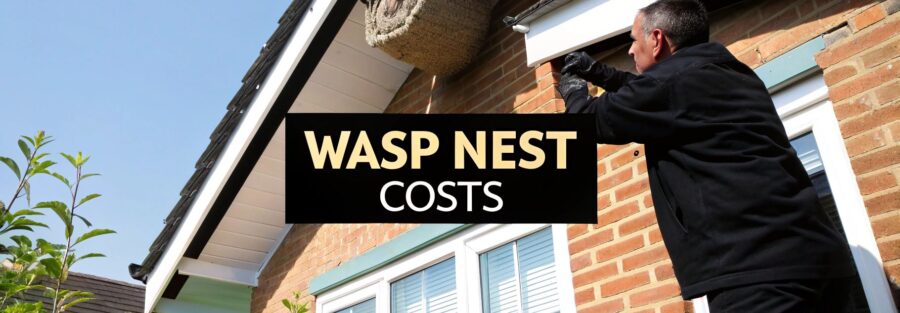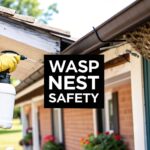Right, you've spotted a wasp nest. That's the first hurdle. The second, naturally, is figuring out what it's going to cost to get rid of it.
On average, you can expect professional wasp nest removal in the UK to cost between £71 and £241, with most homeowners landing somewhere around the £156 mark. But that's not a fixed price—think of it more as a ballpark figure. The final bill really depends on where you are in the country and just how tricky the job is.
Knowing the basics helps you budget and avoid any nasty surprises.
Your Quick Guide to UK Wasp Nest Removal Costs
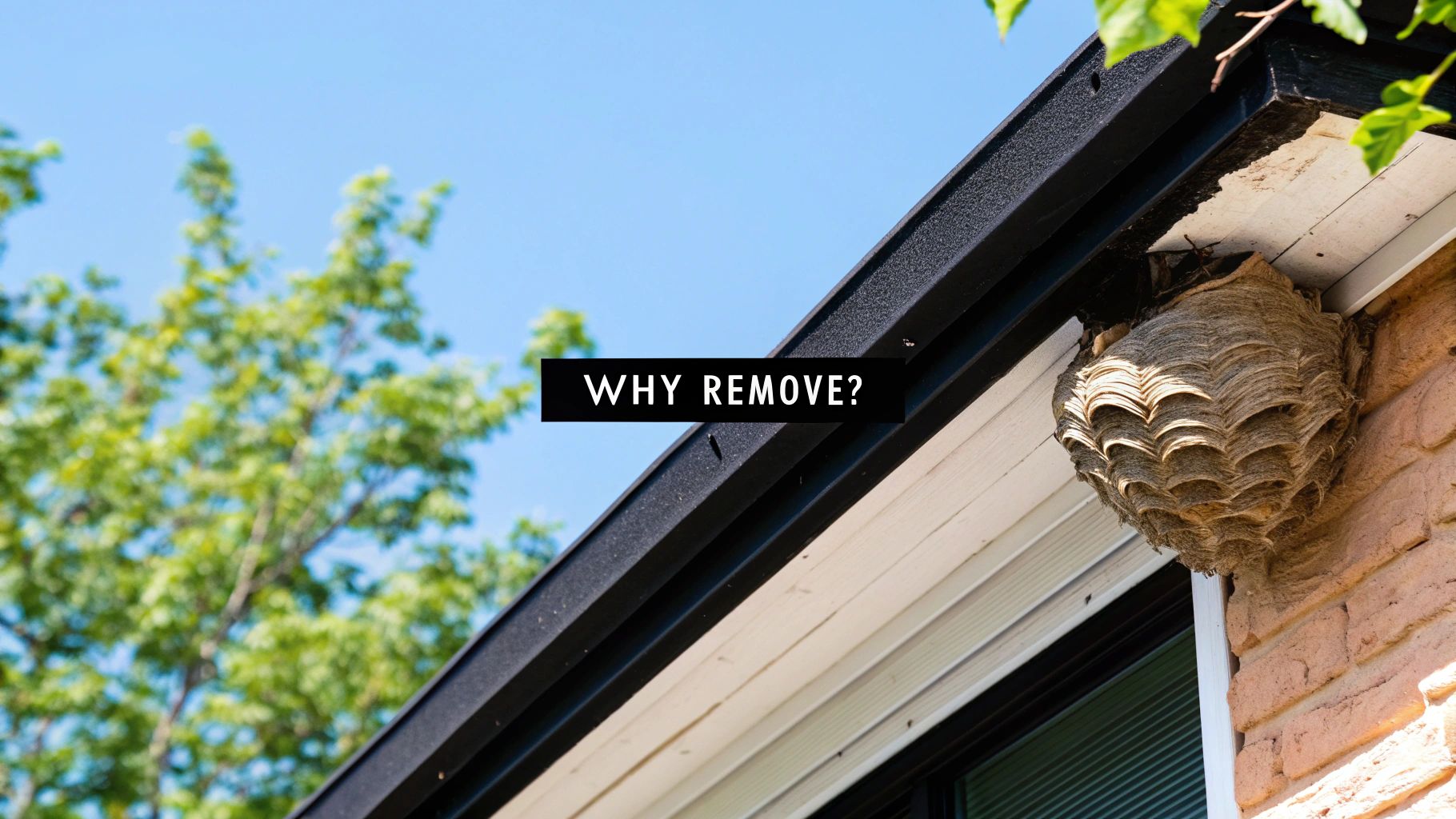
Finding a wasp nest near your home is never a pleasant experience. Your first thought is usually about safety, but the second is almost always about the cost. The good news? It's often more affordable than you might think, and it's a small price to pay for the peace of mind that comes with knowing your family is safe.
A few key things will influence the final quote you get from a professional. It’s not just about zapping the nest; it's about the logistics, the risks, and the expertise needed to do it right. Just like any other trade, a straightforward job will always be cheaper than one that needs special gear and a lot more time.
To give you a clearer idea, let's break down the costs into a simple table.
Estimated Wasp Nest Removal Costs at a Glance
| Service Level | Average Cost Range (UK) | Key Influencing Factors |
|---|---|---|
| Standard Removal | £71 – £120 | Easily accessible nest (e.g., shed, low bush, ground level) |
| Complex Removal | £120 – £180 | Nest in a difficult spot (e.g., loft, under eaves, in a wall cavity) |
| Urgent/Emergency | £180 – £241+ | Same-day service, out-of-hours call-out, or multiple nests |
This table gives you a snapshot, but remember these are just estimates. The final cost will always come down to the specific details of your situation.
What Determines the Price?
The main factors that push the price up or down are pretty logical. Each one adds to the time, equipment, and skill needed to handle the job safely.
-
Nest Location and Accessibility: This is the big one. A nest tucked away in a garden shed is a piece of cake compared to one lodged three storeys up under the eaves or deep inside a wall cavity. The harder it is to get to, the more it will cost.
-
Size of the Nest: A small, newly-formed nest is one thing. A huge, established one buzzing with thousands of angry wasps is another beast entirely. Larger nests require more insecticide and a much more careful, time-consuming approach.
-
Your Geographic Location: Where you live matters. As with most services, prices in big cities like London can be 40% to 50% higher than in smaller towns. It all comes down to higher operational costs for the pest controller. For more pricing insights, you can often find user-reported costs on sites like Airtasker.
A professional service isn't just about killing the wasps you can see; it's about eliminating the entire colony, including the queen, to ensure the problem doesn't return. This guarantee is a core part of what you are paying for.
What Really Drives Removal Costs?
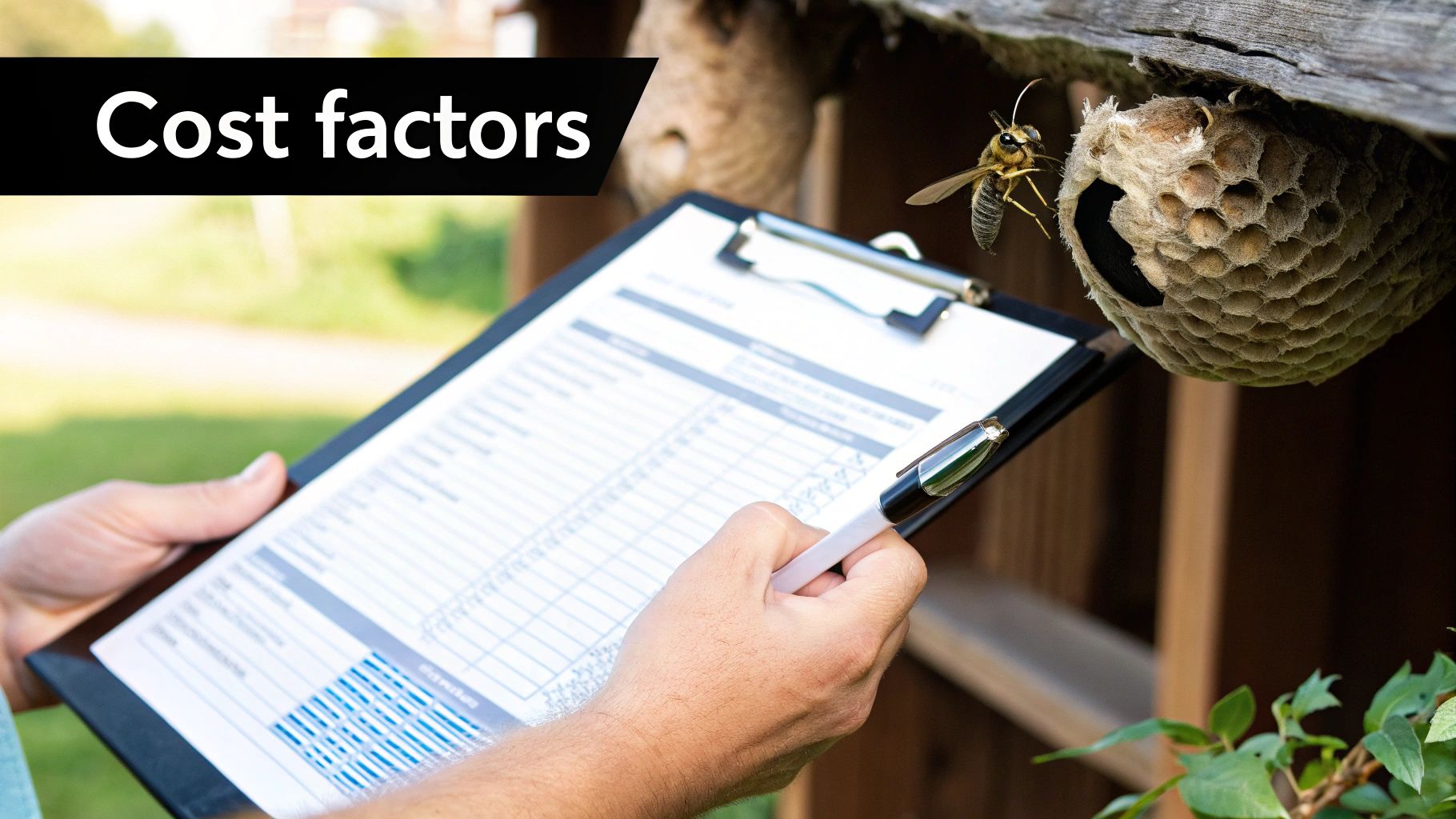
Ever wondered why one quote for a wasp nest removal comes in at a modest £75 while another is well over £200? The pricing isn't just plucked out of thin air; it’s a careful calculation based on time, risk, and the resources needed to get the job done safely.
Several key factors directly influence the final cost, turning what seems like a simple task into a much more complex operation. Knowing what these are helps you understand exactly what you're paying for and why quotes can vary so much between different jobs.
Location and Accessibility: The Biggest Price Factor
Think of a pest controller like a delivery driver. A parcel dropped off at a ground-floor flat is quick and straightforward. But one that needs hauling up to a top-floor flat with no lift? That's a different story—it takes more time, more effort, and specialised gear. The same logic applies to the cost of wasp nest removal.
The location of the nest is, without a doubt, the single biggest driver of the price. An easily accessible nest tucked away in a garden shed or hanging from a low bush is the simplest scenario. The technician can walk right up, treat it safely, and be on their way with minimal fuss.
Things get trickier—and more expensive—when a nest is located high up under the eaves, deep inside a wall cavity, or at the back of a cramped loft. These situations often call for:
- Specialist Ladders: You can't reach a second-floor nest without professional-grade ladders and the right safety harnesses.
- Intricate Treatment: Nests inside walls might need small holes drilled to inject insecticidal dust directly into the void where the wasps are living.
- Increased Time and Risk: Working at height or in a tight space is just plain more dangerous and time-consuming for the technician.
The rule of thumb is simple: the harder and more dangerous a nest is to reach, the higher the labour cost. You’re not just paying for the insecticide, but for the technician's expertise and safety in what can be a hazardous environment.
Other Key Cost Influences
While accessibility is the main event, other factors also play a part in shaping your final quote. Think of them as modifiers that fine-tune the price based on the unique demands of your specific situation.
Nest Size and Maturity
A small, golf-ball-sized nest found in early spring is a world away from a massive, football-sized nest teeming with thousands of angry wasps in late summer. A larger, more established colony needs more insecticide and a much more cautious approach to make sure the job is done right.
Wasp Species
Different species pose different challenges. Common wasps often build their nests in sheltered spots, while hornets can be particularly aggressive and prefer to build their large nests high up. A pro will identify the species to determine the best approach and the level of risk involved.
Number of Nests
If you're unlucky enough to have multiple nests on your property, a technician will often offer a reduced price for treating the second or third nest during the same visit. The total cost will be higher than for a single nest, but the per-nest rate is usually lower since they're already on-site.
Real-world pricing confirms that location is king. A recent breakdown showed that ground-floor nests typically cost around £75 to treat. Nests on the first floor or in a roof space? That can easily push the price up to £95 or £100. For more insights, you can find great information on UK wasp nest pricing on howtopestcontrol.co.uk.
How Location Affects Wasp Removal Prices
When you get a quote for wasp nest removal, it’s not just about the size of the nest – your postcode plays a bigger role than you might think. The cost of wasp nest removal can swing quite a bit depending on whether you’re in a busy city centre or a sleepy rural village. This is pretty standard across most home services, and for good reason.
Think of it like ordering a takeaway. A restaurant in central London is dealing with higher rent, wages, and traffic than one in a small town. Naturally, those costs get passed on to the customer. Pest control companies work on the exact same principle.
Urban Hubs vs Rural Retreats
Technicians based in major cities like London, Manchester, or Birmingham simply have higher running costs. We’re talking about everything from fuel and van insurance to staff wages and renting a base of operations. Because of this, you’ll often find that professional pest control services in these areas are 15-20% more expensive than in less built-up regions.
It all comes down to basic economics. A higher cost of living combined with greater demand in densely populated areas means companies have to charge more to stay in business. If you want to get a feel for what’s on offer, you can explore various pest control services to see how prices and availability can change from one place to another.
The image below gives a great visual of how a nest's size impacts the price, which is a constant factor no matter where you live.
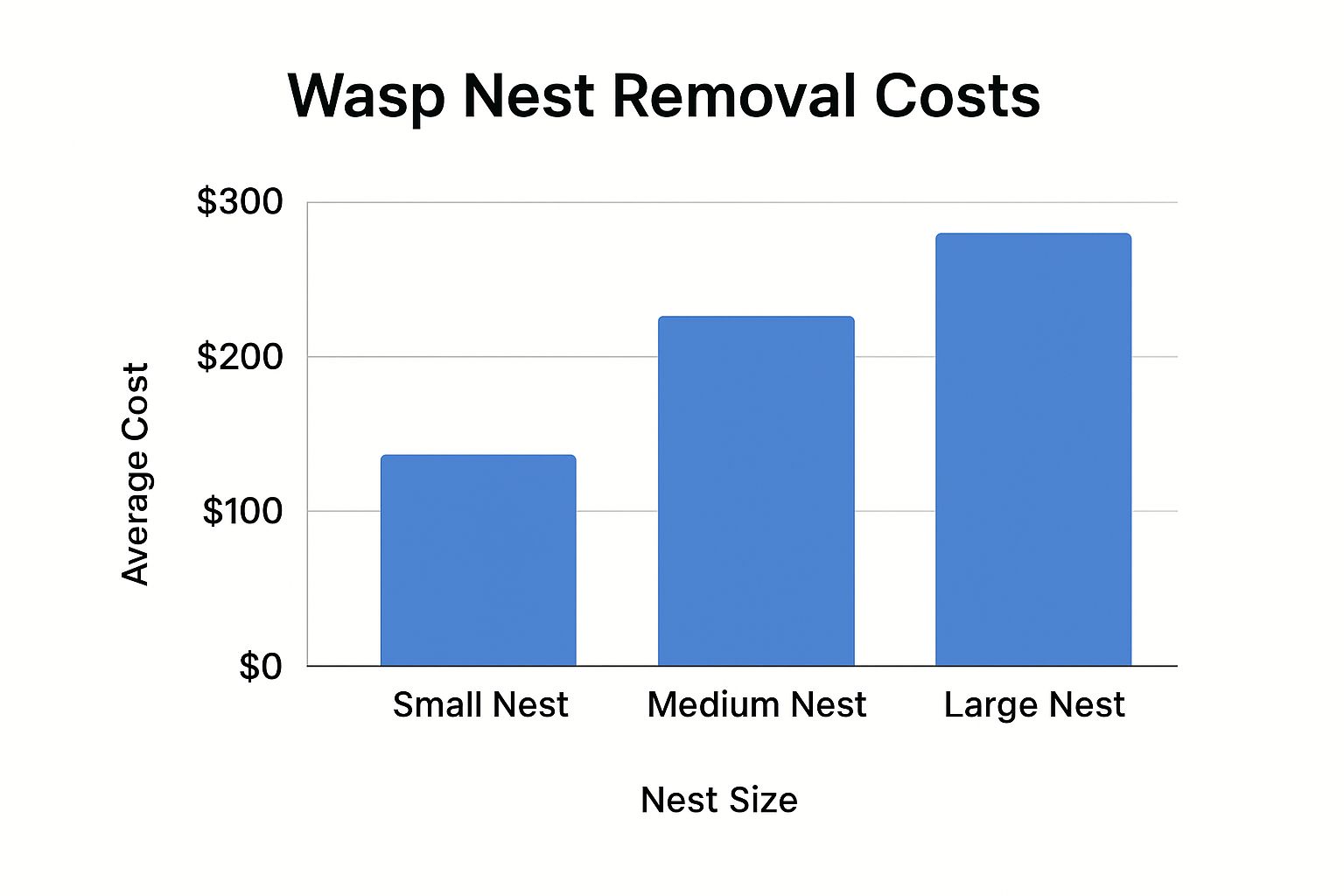
As you can see, there’s a clear link between how big the nest is and what you’ll pay. That base price is then adjusted up or down based on the local economic factors we've been talking about.
A Quick Look at Regional Wasp Removal Costs
To give you a clearer picture, here’s a rough guide to what you might expect to pay for a standard wasp nest removal across different parts of the UK. Remember, these are just estimates – the final price will always depend on the specifics of your situation.
| UK Region / City | Estimated Cost Range | Notes on Local Factors |
|---|---|---|
| London & South East | £75 – £120+ | Highest operational costs (fuel, wages, ULEZ) drive prices up. Greater competition can sometimes help. |
| Manchester & North West | £65 – £95 | Major city costs apply, but generally more moderate than London. |
| Birmingham & Midlands | £60 – £90 | A central hub with competitive pricing, balancing urban costs with accessibility. |
| Scotland (Glasgow/Edinburgh) | £70 – £100 | Urban centres have higher rates, while more remote areas may include travel surcharges. |
| Wales (Cardiff/Swansea) | £60 – £85 | Prices are often lower than in English cities, but access to rural locations can be a factor. |
| South West (Bristol/Cornwall) | £65 – £95 | A mix of urban centres and vast rural areas means prices can vary significantly by postcode. |
This table highlights just how much your location can influence the final bill. Using these figures as a benchmark can help you spot a quote that’s either suspiciously cheap or unreasonably high for your neck of the woods.
Understanding Your Local Market Rate
Knowing about these regional price differences is your best tool for getting a fair deal. It helps you benchmark any quotes you receive against what’s considered the going rate in your area.
Here’s a simple breakdown to keep in mind:
- Major Cities (e.g., London, Edinburgh): Prepare for prices at the higher end of the national average. It’s just the cost of doing business there.
- Suburban Areas: Costs usually land somewhere in the middle, reflecting a balance between good access and lower overheads.
- Rural Locations: You’ll often find the most competitive prices here, although you might have fewer local companies to choose from.
Being armed with this knowledge helps you judge whether a quote is fair, a bit steep, or too good to be true. A price that seems incredibly low for your area should set off alarm bells – it could be a sign of an inexperienced or, worse, an uninsured operator.
Professional vs. DIY: The Hidden Costs
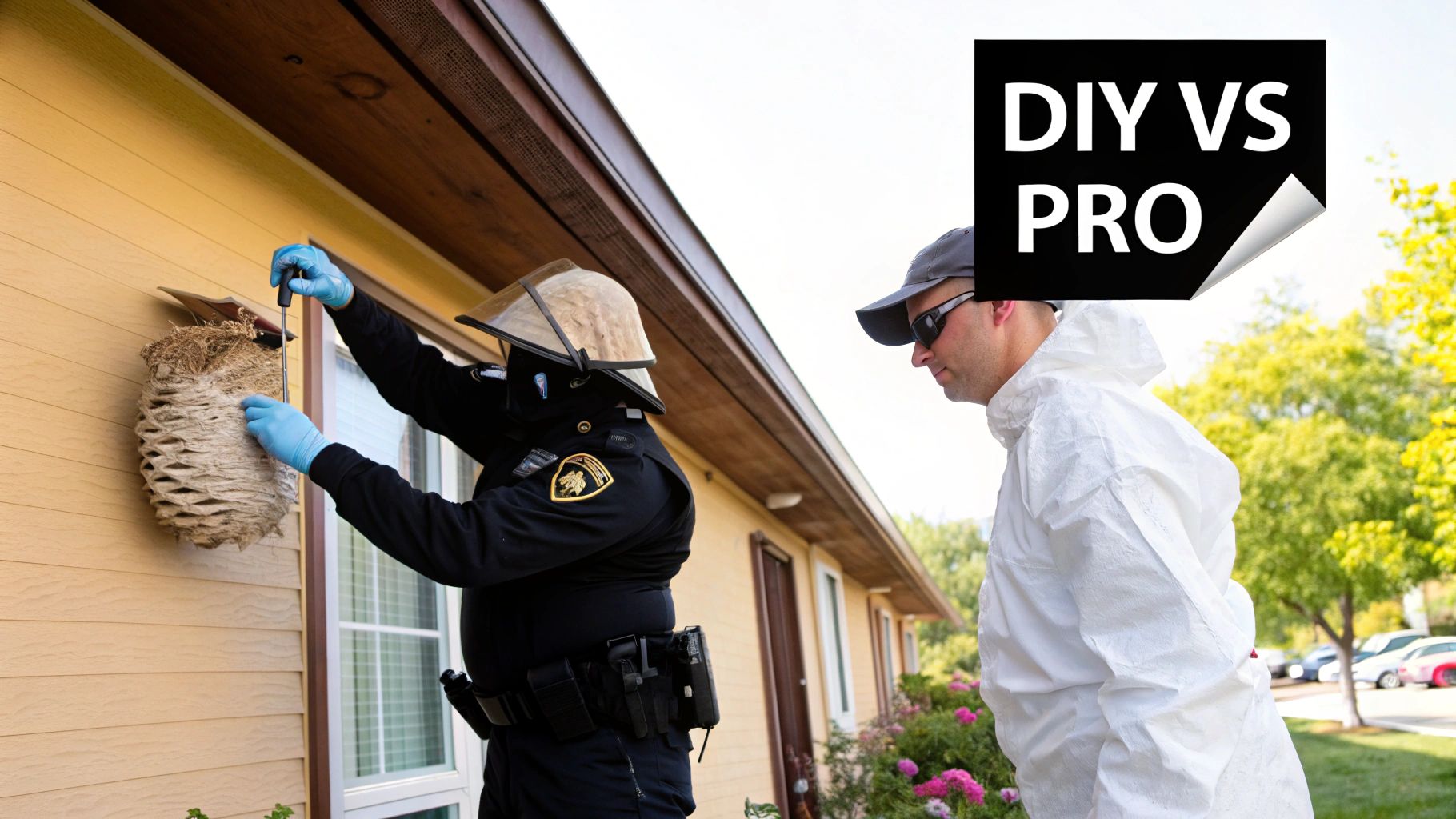
Grabbing a can of wasp killer foam from the local hardware shop seems like a cheap and easy win. When you see its small price tag next to a professional quote, the DIY route feels like a no-brainer. But that initial saving can be misleading, hiding a whole host of hidden costs and serious risks that you don't see at first.
The true cost of wasp nest removal isn't just about what you spend upfront. It’s about the value you get in safety, effectiveness, and peace of mind. A professional service comes with a clear fee, but what you’re really buying is certainty—something a can of spray just can't offer.
The Real Price of a DIY Attempt
Going it alone often means you’re up against more than just a few angry wasps. The financial and physical risks can stack up fast, turning what looked like a saving into a much bigger expense. The most common trap is a failed treatment. That shop-bought product might knock down the wasps you can see, but it rarely gets deep enough to take out the queen and the rest of the colony.
This usually leads to a frustrating cycle of buying more products and trying again, with the costs of sprays and foams adding up. Even worse, an agitated colony that survives the first attempt is far more aggressive, making it more dangerous for everyone nearby. To really get a grip on what it takes, understanding how to properly kill a wasp colony shows why a half-hearted approach just won't cut it.
Beyond the cost of buying multiple products, you need to factor in these other potential DIY expenses:
- Medical Bills: A single wasp sting is painful enough, but an attack from a swarm can mean dozens. For anyone with an allergy, this is a life-threatening emergency. Even if you're not allergic, multiple stings can easily lead to a trip to the doctor or A&E.
- Property Damage: Panicked attempts to get rid of a nest can go seriously wrong. Spraying chemicals without care can stain your walls or woodwork. Trying to get to a nest inside a wall without knowing what you're doing can cause real damage to your home’s structure.
- Buying Safety Gear: Proper protective clothing isn't cheap. Trying to remove a nest without it is incredibly risky, but buying gear for a one-off job just adds another cost to your DIY project.
What Your Professional Fee Actually Covers
When you hire a professional, you're not just paying for someone to spray a nest. That fee is a complete package covering expertise, safety, and a guarantee that the job will be done right. It's an investment in a safe, permanent solution the first time around.
A professional technician’s fee covers not only the immediate treatment but also the insurance, specialised equipment, and expert knowledge required to handle a hazardous situation without risk to your family or property.
Think of it like the difference between changing your car's oil yourself and taking it to a qualified mechanic. Sure, you could probably do it, but the professional has the right tools, the experience, and the liability cover if anything goes wrong.
A professional service typically includes:
- Expertise and Correct Identification: A trained technician knows exactly what species of wasp you have, can judge how developed the nest is, and will choose the safest and most effective way to treat it.
- Specialised Equipment: Professionals have access to commercial-grade insecticides that are far more powerful than anything you can buy over the counter. They also have the proper protective suits and tools to work safely at height or in tricky spots.
- Guaranteed Results: Most reputable pest control companies guarantee their work. If the wasps come back, they’ll return to sort it out at no extra cost.
- Insurance and Peace of Mind: Professional pest controllers are fully insured. In the unlikely event that something goes wrong and your property is damaged, you’re covered. That’s a level of protection you simply don't get when you go it alone.
How to Read Your Pest Control Quote
Getting a pest control quote can feel a bit like deciphering a secret code. You see the final number, but what does it actually cover? Understanding the breakdown is the key to comparing different offers properly and making sure there are no nasty surprises waiting for you down the line.
A professional quote should be much more than just a single figure slapped on a piece of paper. Think of it as an investment in expertise, safety, and a guaranteed result, not just a one-off product purchase. It’s the blueprint for solving your wasp problem for good.
Core Components of a Standard Quote
At its heart, any quote worth its salt will clearly lay out the fundamental services you're paying for. This transparency is a good sign you're dealing with a reputable company. Here’s what you should expect to see listed as standard:
- Initial Survey and Risk Assessment: This covers the technician’s time to pop round, size up the situation, identify the wasp species, and figure out the safest and most effective way to tackle the nest.
- Treatment Application: This is the main event. It includes the cost of the professional-grade insecticide (far more potent than anything you can buy in a shop) and the labour to apply it correctly.
- Guaranteed Eradication: Most pros will stand by their work. This means if the first treatment doesn't quite finish the job, they'll come back and re-treat the nest at no extra cost to you.
Seeing these basics clearly itemised gives you confidence. It shows the company is transparent and knows what they're doing. You can get a better feel for how these elements come together by exploring what a full wasp nest removal service involves.
Spotting Potential Extra Charges
The price you first see isn't always the final price. Certain situations can add to your bill, and a good quote will be upfront about these potential costs. It's always best to ask about them before any work starts.
It's a common mistake to assume the initial quote covers every possible scenario. Always ask, "What if it's more complicated than you think?" That's often where hidden costs creep in.
Make sure you clarify any potential add-ons with your pest controller. These are the most common ones:
- Emergency or Weekend Call-Outs: Need someone on a Sunday or a bank holiday? You can expect to pay a premium for an out-of-hours service.
- Follow-Up Visits: If a treatment fails and isn't covered by a guarantee, you might be charged for a second visit.
- Physical Nest Removal: The treatment kills the wasps, but the nest itself remains. If you want the physical structure taken away (which usually isn't necessary), this will almost always be a separate, additional charge.
Recent figures really highlight how these extras can bump up the cost of wasp nest removal. While a standard job in the UK typically falls between £89 + VAT and £160, an emergency call-out can push that figure up significantly. And if a follow-up visit is needed but isn't included in the guarantee, it could add another £50 to £150 to your final bill. You can find out more about 2024 pest control pricing insights on bugwisepestcontrol.co.uk.
Common Questions About Wasp Removal Costs
When you’re staring up at a wasp nest, one of the first things that comes to mind is, "How much is this going to cost me?" It’s a perfectly normal question, and understanding the process can help you budget properly and choose a professional with confidence.
Let's clear up some of the most common queries we hear from homeowners across the UK.
Does My Local Council Offer Free Wasp Nest Removal?
This is easily the most frequent question we get, and the short answer is almost certainly no. A decade or two ago, some local councils might have offered subsidised pest control, but those days are long gone.
Widespread budget cuts mean the vast majority of UK councils no longer deal with wasp nests on private property. They’ll simply advise you to call a professional pest control company. It's always worth a quick look on your council's website just in case, but you should expect to hire a private firm.
Is It Cheaper to Remove a Wasp Nest in Winter?
There's no cost benefit here because, frankly, it’s not necessary. Wasps in the UK have an annual life cycle. Come late autumn, the queen, workers, and drones all die off naturally. Only the newly mated queens survive, and they find somewhere else to hibernate, never returning to the old nest.
An old, papery nest you find in the winter is completely inactive. Since wasps don't reuse nests, there's no reason to pay to have it removed unless it’s blocking a vent or you just don't like the look of it. Any good professional will tell you to just leave it be.
Does Home Insurance Cover Wasp Nest Removal?
In most cases, no. Standard home insurance policies typically see pest control as part of routine home maintenance, not a sudden, unforeseen event like a flood or fire. Because of this, it's usually excluded from cover.
Some higher-tier policies might have a ‘Home Emergency’ add-on that could potentially include pest infestations. This isn't standard, though. The only way to know for sure is to read your policy documents carefully or call your insurer directly.
How Can I Get the Best Price for Wasp Nest Removal?
Getting a fair price without cutting corners on safety is key. A little bit of homework can save you a headache and some cash. Think of it like getting a quote for any other trade.
Here are a few simple steps to make sure you’re getting good value:
- Get Multiple Quotes: Don't just call the first company you find. Ring at least three different reputable pest controllers to get a feel for the going rate in your area.
- Ask for a Breakdown: A professional quote should be clear. Ask what’s included – does it cover the call-out, treatment, and any follow-up visits if needed? This helps you avoid nasty surprises.
- Check Their Credentials: Are they a member of a trade body like the British Pest Control Association (BPCA)? Membership is a great sign that they’re trained, insured, and work to high standards.
- Book on a Weekday: If it's not a full-blown emergency, scheduling the job for a normal weekday is often cheaper than an urgent weekend or bank holiday call-out.
Following these tips will help you find a qualified pro at a fair price, getting your wasp problem sorted safely and for good.
If you're facing a wasp problem and need a safe, reliable solution, Pest Predators Limited offers expert services grounded in scientific knowledge and years of practical experience. We provide effective, long-term solutions to protect your home and give you peace of mind. Contact us today to discuss your needs and get a transparent, no-obligation quote at https://www.pestpredatorslimited.co.uk.

